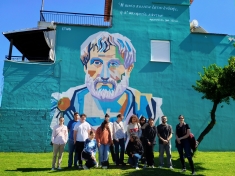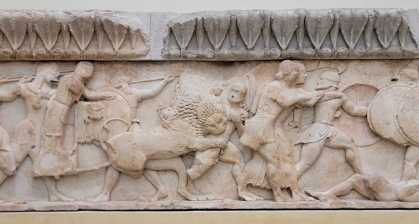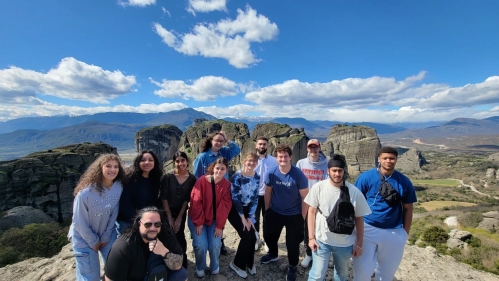Professor led students on spring break trip to explore sites, artifacts, and museums that provided a unique perspective on ancient and modern times.
Nearly every student has learned about ancient Greece as part of their middle school history curriculum. However, for most students, the civilization’s people and architecture will never be more than pictures in a book. Kimberlee Moran, associate teaching professor in the Department of Sociology, Anthropology, and Criminal Justice at Rutgers University–Camden, challenged that worn-out formula by creating a course that allowed 12 students interested in history, archaeology, and anthropology the chance to connect with the foundations of Western society and culture by traveling to Greece during spring break.
“As an undergraduate major of classical and Near Eastern archaeology, the sites I studied in my classes seemed detached from reality,” said Moran. “It wasn’t until my late 20s, when I traveled to Ephesus, in what is now Turkey, that all those names and dates I was forced to memorize as a freshman finally clicked.
If only I had seen first-hand what I was learning, I am sure I would have been more engaged in my studies.
Kimberlee Moran
Associate Teaching Professor
Moran designed the course to allow students to visit sites including the Acropolis; the Delphic temple of Apollo; the archaeological park and museum at Dion—where legend has it the prophet Orpheus died and was buried; field sites related to lives and writings of the philosophers Aristotle and Plato, and much more.
“I asked the students to use these in-depth explorations to investigate the sometimes uneasy relationship between the present and the past,” explained Moran. “How do we progress as a society and still appreciate and preserve our cultural heritage?”
Moran said class meetings before the trip focused on the history of Greece and the sites they would visit. Classes after the trip are reflecting upon the impact of Greek civilization on architecture, modern learning environments, and the moral philosophy of the United States.

For English major and history of Western philosophy minor Sadie Fiore, a graduating senior, the trip to Greece was her first time abroad—and her first time on an airplane.
“I was excited by the prospect of seeing places and artifacts that, until now, I had only read about in books,” Fiore said. “I had never left the United States, and this seemed like a great opportunity to do so.”
Fiore added that the trip provided a supportive environment in which to learn and travel. “I felt empowered to try new things,” she said. “It was great to know that Professor Moran had knowledge and experience—and she had my back, too!”
Summer Piotti, a junior nursing major, said she was inspired to take the course because she was interested in the subject matter and because the trip was available over spring break.
“This course was the best of both worlds,” said Piotti. “It was enriching and interesting.”
Moran said the trip stood out as a valuable learning experience. “For students to see what they are learning about is academically significant. Plus, the trip was a lesson in cultural understanding that broadened the students’ worldviews—and it was really fun!”
Rutgers–Camden is committed to exposing its students to new countries, new customs, and different ways of living as they work to become global citizens. The Chancellor’s Learning-Abroad Course Scholarship offers qualified students financial assistance for pursuing international study.




